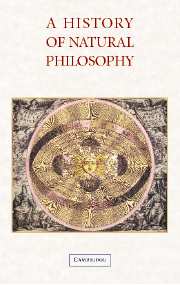Book contents
- Frontmatter
- Contents
- Preface
- 1 Ancient Egypt to Plato
- 2 Aristotle (384–322 BC)
- 3 Late Antiquity
- 4 Islam and the Eastward Shift of Aristotelian Natural Philosophy
- 5 Natural Philosophy before the Latin Translations
- 6 Translations in the Twelfth and Thirteenth Centuries
- 7 Natural Philosophy after the Translations: Its Role and Place in the Late Middle Ages
- 8 The Form and Content of Late Medieval Natural Philosophy
- 9 The Relations between Natural Philosophy and Theology
- 10 The Transformation of Medieval Natural Philosophy from the Early Modern Period to the End of the Nineteenth Century
- Conclusion
- Bibliography
- Index
4 - Islam and the Eastward Shift of Aristotelian Natural Philosophy
Published online by Cambridge University Press: 05 June 2012
- Frontmatter
- Contents
- Preface
- 1 Ancient Egypt to Plato
- 2 Aristotle (384–322 BC)
- 3 Late Antiquity
- 4 Islam and the Eastward Shift of Aristotelian Natural Philosophy
- 5 Natural Philosophy before the Latin Translations
- 6 Translations in the Twelfth and Thirteenth Centuries
- 7 Natural Philosophy after the Translations: Its Role and Place in the Late Middle Ages
- 8 The Form and Content of Late Medieval Natural Philosophy
- 9 The Relations between Natural Philosophy and Theology
- 10 The Transformation of Medieval Natural Philosophy from the Early Modern Period to the End of the Nineteenth Century
- Conclusion
- Bibliography
- Index
Summary
Although Neoplatonism and Neoplatonic interpretations of Aristotle's works shaped the understanding of Aristotle's ideas in late antiquity in the Greek world of the Byzantine Empire, Greek science, medicine, and natural philosophy, especially Aristotle's natural philosophy, were disseminated eastward into Syria and Persia, largely by way of translations, first from Greek into the Syriac language, and then Syriac and Greek into Arabic. Religious tensions and animosities were the major catalyst for this eastward thrust of Greek science and natural philosophy. To strike a blow against paganism, the Roman Emperor Justinian closed the Neoplatonic philosophical school in Athens in 529 ad. A number of the philosophers at the school, including Simplicius, opted to move to Persia and continue their philosophizing under the aegis of the Persian king, Chosroes. In time, however, all of these philosophers chose to return to the Byzantine Empire. King Chosroes made an arrangement with Emperor Justinian to allow their return on condition that Justinian would not coerce them into embracing the Christian faith. Justinian honored his commitment and the returning philosophers lived in peace.
THE TRANSLATIONS
But the major problem for the Byzantine Empire derived from two schismatic sects, the Nestorians and Monophysites. The Nestorians took their name from Nestorius, who had been a monk in Antioch but was made Patriarch of Constantinople in 428. Anastasius, who also had been a monk in Antioch, insisted that the Blessed Virgin Mary was the mother only of the human body of Christ, and not of Christ's divinity.
- Type
- Chapter
- Information
- A History of Natural PhilosophyFrom the Ancient World to the Nineteenth Century, pp. 61 - 94Publisher: Cambridge University PressPrint publication year: 2007



